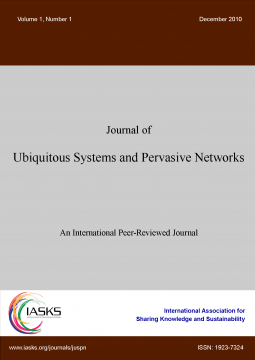volume-18-Issue 2 (2023)
Latest Articles
Enhancement of the TSCH-Sim Simulator via Web Service Interface to Support Co-simulation Optimization
JUSPN, volume-18, Issue 2 (2023) , PP 69 - 76
Published: 02 Apr 2023
DOI: 10.5383/JUSPN.18.02.003
by Tarana Ara, Aida Vatankhah, Ramiro Liscano from Ontario Tech University, Oshawa, Canada, L1G 0C5
Abstract: Co-simulation is an important concept in the optimization of computer networks because a typical optimization scenario integrates an optimization algorithm with a network simulator. In many cases optimization algorithms are implemented in the MATLAB environment while network simulators are implemented as stand alone applications. In this paper we present enhancements to the TSCH-Sim network simulator in order to facilitate its integration with an optimization algorithm. The core enhancement is the definitions and implementation of a set of REST APIs for TSCH-Sim that allows a remote optimization algorithm to set the network configuration, routes, and 802.15.4e TSCH schedule of a sensor network. The significance of the REST API is demonstrated through the integration of a Differential Evolution based TSCH scheduling optimizer executing in MATLAB leveraging the TSCH-Sim simulator through the REST APIs in order to find a TSCH schedule that maximizes throughput. read more... read less...
Keywords: 802.15.4e TSCH, TSCH-Sim, REST-API, Co-simulation, DE Optimization, MATLAB Simulation
Combining the Internet of Things (IoT) and the Internet of Behavior (IoB) to create a robust educational environment
JUSPN, volume-18, Issue 2 (2023) , PP 61 - 68
Published: 02 Apr 2023
DOI: 10.5383/JUSPN.18.02.002
by Ossama H. Embarak from Higher Colleges of Technology Dept. of Computer Sciences, Fujairah, UAE
Abstract: The ongoing COVID-19 pandemic has accelerated the adoption of e-learning, remote learning, and hybrid models in education. These models have become essential in meeting the demands of smart cities and addressing the limitations of traditional distance learning. However, to truly achieve academic success, education must be adaptive and tailored to the individual needs of students. This study presents a novel concept for intelligent educational systems that integrate Explainable Artificial Intelligence (XAI) and Internet of Behavior (IoB) technologies. The integration of these technologies aims to revolutionize intelligent educational systems by providing a more personalized and effective learning experience. By collecting and analyzing student behavior data, the system can provide real-time feedback and adjust to meet the needs of each individual student. The results of this study demonstrate the significant impact of IoB technology on student performance. The integration of IoB led to a substantial increase in student response from 40% to 79%. These findings highlight the potential for IoB to enhance learner assistance and improve system modifications to better meet the expectations of students for increased performance. The proposed concept of integrating XAI and IoB technologies in intelligent educational systems can pave the way for a more personalized and effective learning experience in the future. read more... read less...
Keywords: Tailored education, Hybrid models, Smart cities, XAI (Explainable Artificial Intelligence), IoB (Internet of Behavior) Personalized education Adaptive learning
Predicting Cardiovascular Events with Machine Learning Models and Heart Rate Variability
JUSPN, volume-18, Issue 2 (2023) , PP 49 - 59
Published: 02 Apr 2023
DOI: 10.5383/JUSPN.18.02.001
by Mohammad Moshawrab, Mehdi Adda, Abdenour Bouzouane, Hussein Ibrahim, Ali Raad from Département de Mathématiques, Informatique et Génie, Université du Québec à Rimouski, 300 Allée des Ursulines, Rimouski, G5L 3A1, Québec, Canada, Département D’informatique et de Mathématique, Université du Québec à Chicoutimi, Chicoutimi, 555 boulevard de l’Université, Chicoutimi, QC G7H 2B1, Canada, Institut Technologique de Maintenance Industrielle, 175 Rue de la Vérendrye, Sept-Îles, G4R 5B7, Québec, Canada and Dean of the Faculty of Science and Arts, Islamic University of Lebanon, Wardaniyeh, Lebanon
Abstract: Artificial Intelligence (AI) is increasingly becoming a potential answer to many of science’s most challenging problems. In this context, healthcare is using this technology and its advancement to improve the quality of services provided, including cardiac healthcare services. According to studies, Cardiovascular Diseases (CVDs) are among the most common and deadly diseases in the world. However, Artificial Intelligence and its branches such as Machine Learning (ML) and Deep Learning (DL) offer tremendous potential to improve disease diagnosis and even predict its occurrence. In this study, eight Machine Learning and Deep Learning models are created and trained with "PhsyioNet Smart Health for Assessing the Risk of Events via ECG Database" to analyze the characteristics of Heart Rate Variability and predict the occurrence of heart disease and cerebrovascular events. The results support the use of Artificial Intelligence in cardiology, with five of the proposed models outperforming previous implementations. Specifically, Support Vector Machines, TabTransformers, Deep Neural Networks, AdaBoost, and XGBoost achieved accuracy rates of 91.80%, 90.38%, 90.19%, 89.50%, and 89.10%, respectively. Further performance metrics are presented throught the article such as precision, recall and others. read more... read less...
Keywords: Artificial Intelligence, Machine Learning, Deep Learning, Cardiovascular Diseases, Heart Rate Variability

